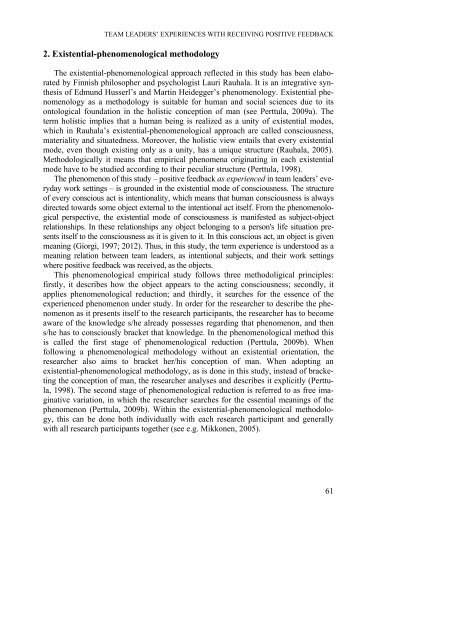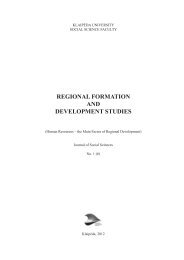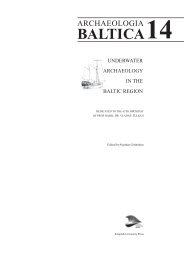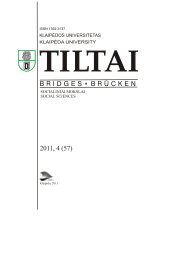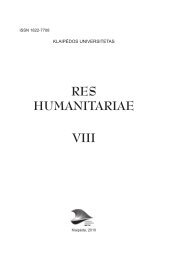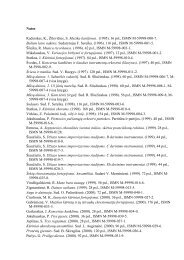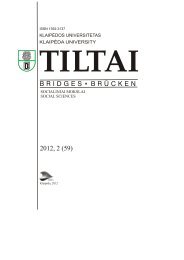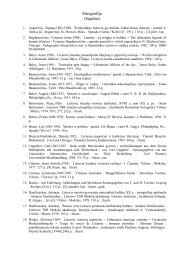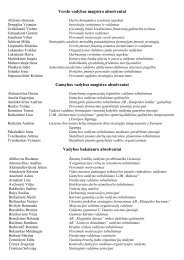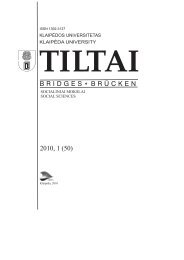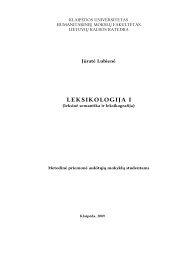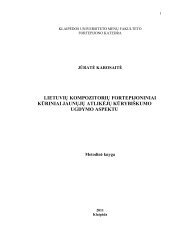2013,1 (62) - KlaipÄdos universitetas
2013,1 (62) - KlaipÄdos universitetas
2013,1 (62) - KlaipÄdos universitetas
Create successful ePaper yourself
Turn your PDF publications into a flip-book with our unique Google optimized e-Paper software.
TEAM LEADERS’ EXPERIENCES WITH RECEIVING POSITIVE FEEDBACK<br />
2. Existential-phenomenological methodology<br />
The existential-phenomenological approach reflected in this study has been elaborated<br />
by Finnish philosopher and psychologist Lauri Rauhala. It is an integrative synthesis<br />
of Edmund Husserl’s and Martin Heidegger’s phenomenology. Existential phenomenology<br />
as a methodology is suitable for human and social sciences due to its<br />
ontological foundation in the holistic conception of man (see Perttula, 2009a). The<br />
term holistic implies that a human being is realized as a unity of existential modes,<br />
which in Rauhala’s existential-phenomenological approach are called consciousness,<br />
materiality and situatedness. Moreover, the holistic view entails that every existential<br />
mode, even though existing only as a unity, has a unique structure (Rauhala, 2005).<br />
Methodologically it means that empirical phenomena originating in each existential<br />
mode have to be studied according to their peculiar structure (Perttula, 1998).<br />
The phenomenon of this study – positive feedback as experienced in team leaders’ everyday<br />
work settings – is grounded in the existential mode of consciousness. The structure<br />
of every conscious act is intentionality, which means that human consciousness is always<br />
directed towards some object external to the intentional act itself. From the phenomenological<br />
perspective, the existential mode of consciousness is manifested as subject-object<br />
relationships. In these relationships any object belonging to a person's life situation presents<br />
itself to the consciousness as it is given to it. In this conscious act, an object is given<br />
meaning (Giorgi, 1997; 2012). Thus, in this study, the term experience is understood as a<br />
meaning relation between team leaders, as intentional subjects, and their work settings<br />
where positive feedback was received, as the objects.<br />
This phenomenological empirical study follows three methodoligical principles:<br />
firstly, it describes how the object appears to the acting consciousness; secondly, it<br />
applies phenomenological reduction; and thirdly, it searches for the essence of the<br />
experienced phenomenon under study. In order for the researcher to describe the phenomenon<br />
as it presents itself to the research participants, the researcher has to become<br />
aware of the knowledge s/he already possesses regarding that phenomenon, and then<br />
s/he has to consciously bracket that knowledge. In the phenomenological method this<br />
is called the first stage of phenomenological reduction (Perttula, 2009b). When<br />
following a phenomenological methodology without an existential orientation, the<br />
researcher also aims to bracket her/his conception of man. When adopting an<br />
existential-phenomenological methodology, as is done in this study, instead of bracketing<br />
the conception of man, the researcher analyses and describes it explicitly (Perttula,<br />
1998). The second stage of phenomenological reduction is referred to as free imaginative<br />
variation, in which the researcher searches for the essential meanings of the<br />
phenomenon (Perttula, 2009b). Within the existential-phenomenological methodology,<br />
this can be done both individually with each research participant and generally<br />
with all research participants together (see e.g. Mikkonen, 2005).<br />
61


